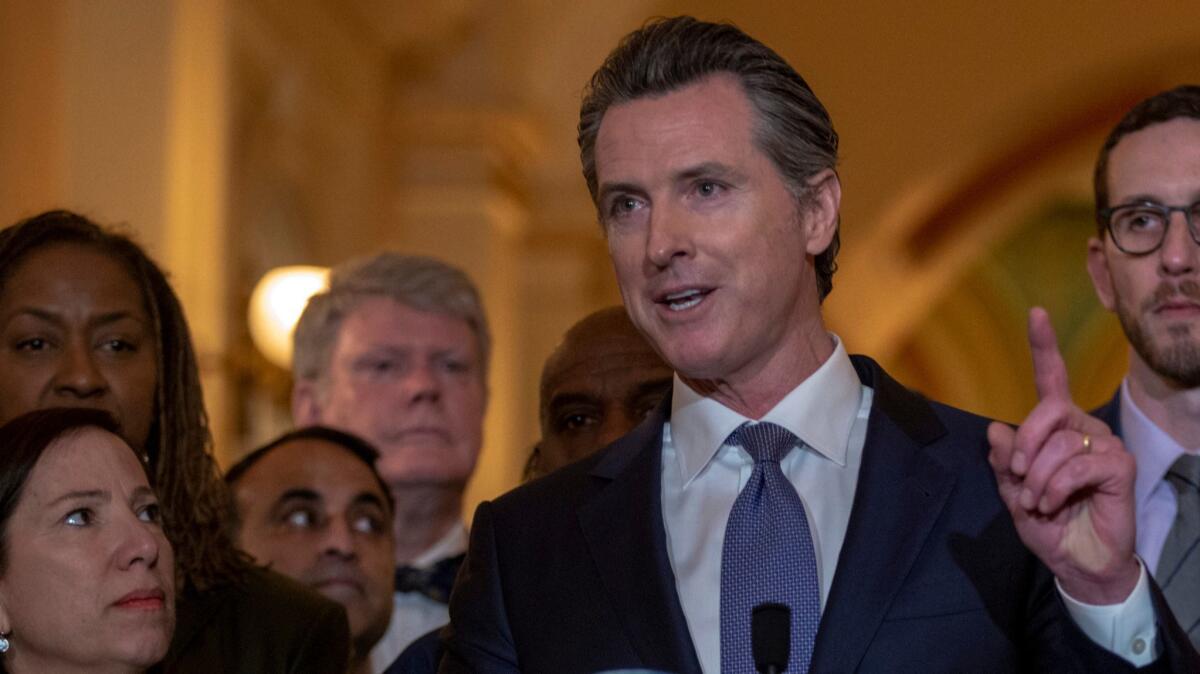Capitol Journal: Gov. Gavin Newsom is developing a bad habit: ignoring the will of voters

- Share via
Reporting from Sacramento — Gov. Gavin Newsom has drawn heavy flak for kissing off the voters on capital punishment. He’s also ignoring promises made to voters when they supported a gas tax and vehicle fee increase.
This could be a dangerous trend for the new governor. If a powerful elected official were perceived as two-faced with his word and dismissive of the voters’ desires, he’d be headed for the political cliff.
The voters would become even more cynical and mistrustful of government, making it harder yet for politicians to gain public support for major projects and policy changes.
First, a revisit to the death penalty:
After Newsom declared a moratorium on capital punishment last week, I wrote that he deserved credit for having the guts to act on his convictions.
He still does. But he’s being legitimately criticized for snubbing the will of voters after they chose twice in recent years to retain capital punishment. They even voted in 2016 to expedite executions.
Moreover, Newsom previously promised to carry out capital punishment even if he opposed it.
Campaigning in 2016 for capital punishment repeal, the then-lieutenant governor told the Modesto Bee editorial board that if he were elected governor: “I would be accountable to the will of the voters. I would not [put] my personal opinions in the way of the public’s right to make a determination of where they want to take us as [it] relates to the death penalty.”
After Newsom did just the opposite last week, the Bee editorialized that “the governor’s lack of principle and failure to keep his promise is a slap in the face to survivors of heinous murders…. There is no excuse for governing by edict just because a leader doesn’t like what voters have said.”
Last year, when Newsom was running for governor, the San Francisco Chronicle reported that his campaign strategist, Dan Newman, said the Democratic candidate “recognizes that California voters have spoken on the issue and, if elected governor, he’d respect the will of the electorate by following and implementing the law.”
After declaring the moratorium, Newsom was questioned by reporters about breaking promises. He answered that the state Constitution gives him the right to do what he did.
“The will of the voters is also entrusted in me on the basis of my constitutional right to grant a reprieve” to murderers, he said.
But what about his promise?
“I’ve had to process this in a way that I didn’t frankly anticipate,” he said. “A few months ago, it was an abstract question…. [Now] this question is real … a question that goes deep to who I am.”
He is unequivocally a death penalty opponent. But he’d also better make sure he isn’t seen as a governor whose word isn’t worth squat.
Newsom was compared to President Trump on Wednesday by the Los Angeles County Assn. of Deputy District Attorneys.
“The [governor’s] assertion of executive authority is particularly ironic,” wrote association President Michele Hanisee, noting that California is leading a lawsuit against Trump’s declaration of a state of emergency on the U.S.-Mexico border.
“The argument presented in the lawsuit is that the president’s use of this executive authority usurps congressional authority…. How is this moratorium by the governor, which usurps the legislative authority of the voters to enact laws via ballot initiative, any different?”
Now about the gas tax: It took about four years for former Gov. Jerry Brown and Democratic lawmakers to enact legislation raising $5.2 billion annually for road repairs. Much political blood was spilled.
The bill increased the gas tax by 12 cents a gallon and imposed a new annual vehicle fee, ranging from $25 to $175. Out of the pot, 65% goes for road and bridge repairs and 20% for transit. The rest is earmarked for better truck access around ports and for bicycle and pedestrian lanes.
Republican opponents charged that in the past, transportation money had been diverted for other projects. There was a small germ of truth in that. So Democrats sponsored a successful, separate ballot measure guaranteeing that all the new tax money would be safeguarded in a transportation lockbox.
When gas tax opponents placed a repeal measure on last year’s ballot, tax advocates cited that lockbox protection in their official voters’ guide argument. It prevents “Sacramento politicians from raiding transportation funds,” they asserted.
Repeal opponents promised that every community would share in the new transportation funding bonanza. The repeal lost overwhelmingly.
Then Newsom took office and almost immediately proposed legislation to withhold gas tax funds from cities that weren’t doing enough to spur homebuilding — a non sequitur.
“If you’re not hitting your [housing] goals, I don’t know why you get the [transportation] money,” Newsom said. Huh?
After objections, Newsom said he’d delay the money withholding for four years.
“He’s trying to put out carrots and sticks” to prod housing, said Sen. Jim Beall (D-San Jose), chairman of the Senate Transportation Committee, who fought hard to pass the gas tax legislation. “I don’t describe that as either a carrot or a stick. I’d describe that as a nonstarter. I don’t see any [legislator] jumping up and down for it. Most think it’s a lousy idea.”
He added: “It would put a stink on votes for future [ballot measures] like bonds.”
Newsom should reread Article II, Section 1 of the California Constitution. It begins: “All political power is inherent in the people.”
Follow @LATimesSkelton on Twitter
More to Read
Get the L.A. Times Politics newsletter
Deeply reported insights into legislation, politics and policy from Sacramento, Washington and beyond. In your inbox twice per week.
You may occasionally receive promotional content from the Los Angeles Times.











